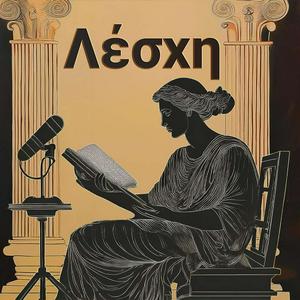Sasha-Mae Eccleston joins me in the Lesche to discuss classicizing and chronopolitics in the contemporary United States. And yes, we talk about that Virgil quotation.Ancient textsHomer, Iliad Euripides & Seneca, MedeaVirgil, Aeneid 9.447 (nulla dies umquam memori uos eximet aeuo)Also mentioned (selection)Modern creative worksEric Fischl, "Tumbling Woman" (2001) (sculpture)Ben Lerner, Angle of Yaw (2006)Adrienne Rich, Tonight No Poetry Will Serve: Poems, 2007-2010 (2011), esp. "Reading the Iliad as if it were the first time" and "Don't flinch"Juliana Spahr, The Connection between Everything with Lungs: Poems (2005)Ocean Vuong, Night Sky with Exit Wounds (2016)Jesmyn Ward, Salvage the Bones (2011)Op/edsCaroline Alexander, "Out of Context," New York Times, April 6, 2011.Tom Brokaw, "Two Dates Which Will Live in Infamy," San Diego Union-Tribune, December 7, 2001.Academic worksScholarship in Temporality Studies by Elizabeth Freeman and Sarah Sharma.Greenwood, Emily. "Reception Studies: The Cultural Mobility of Classics," Daedalus 145.2 (2016): 41-9.Haley, Shelley P. "Self-Definition, Community, and Resistance: Euripides' 'Medea' and Toni Morrison's 'Beloved'," Thamyris 2.2 (1995): 177-206.Van Schepen, Randall. "Falling/Failing 9/11: Eric Fischl's Tumbling Woman Debacle," Aurora: The Journal of the History of ART 9 (2008): 116-43.Wright, Matthew. "Making Medea Medea." In Female Characters in Fragmentary Greek Tragedy, ed. P. J. Finglass and Lyndasy Coo, 216-243. Cambridge 2020.About our guestSasha-Mae Eccleston is currently the John Rowe Workman Assistant Professor of Classics where she is affiliated with the Initiative for Environmental Humanities, the Department of comparative literature, and the Department of Africana studies. She directs the fellowship in critical classical studies for PhDs and/or MFAs. She is cofounder of the scholarly society Eos and of Racing the Classics, a field-wide initiative for early career researchers and doctoral candidates in Classics.________________________________Thanks for joining us in the Lesche!Podcast art: Daniel BlancoTheme music: "The Song of Seikilos," recomposed by Eftychia Christodoulou using SibeliusThis podcast is made possible with the generous support of Brown University’s Department of Classical Studies and the John Nicholas Brown Center for Advanced Study. Instagram: @leschepodcastEmail:
[email protected] a book using this form
